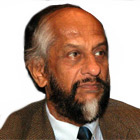 “We have a very apt saying in Hindi, which essentially translates as: ‘When a jackal is threatened, he starts moving toward the city.’ In other words, he becomes more visible. I think some of these guys are speaking out volubly because they read the writing on the wall.”
“We have a very apt saying in Hindi, which essentially translates as: ‘When a jackal is threatened, he starts moving toward the city.’ In other words, he becomes more visible. I think some of these guys are speaking out volubly because they read the writing on the wall.”
That was IPCC chairman Rajendra Pachauri in an interview nearly a year ago, speaking of the increase in the decibel level of contrarians. Even so he was probably not prepared for the strength of the attack they mounted as the year proceeded.
But he is more than ready to defend the IPCC against the attacks it has been receiving. The Guardian has just published a forthright article written by him.
“To dismiss the implications of climate change based on an error about the rate at which Himalayan glaciers are melting is an act of astonishing intellectual legerdemain. Yet this is what some doubters of climate change are claiming. But the reality is that our understanding of climate change is based on a vast and remarkably sound body of science – and is something we distort and trivialise at our peril.”
He reminds readers of the scale of the IPCC’s Fourth Assessment Report (AR4). The IPCC mobilised 450 scientists from all over the world to write it. An additional 800 contributing authors gave specialised inputs and about 2,500 expert reviewers provided 90,000 comments.
“In this mammoth task, which yielded a finished product of nearly 3,000 pages, there was a regrettable error indicating the Himalayan glaciers were likely to melt by the year 2035. This mistake has been acknowledged by the IPCC.”
He reaffirms that the major thrust of the report’s findings provides overwhelming evidence that warming of the climate system is unequivocal, and draws attention to our responsibility to ensure that future generations do not suffer the consequences.
“We cannot ignore the fact that the impacts of climate change, which are based on actual observations, are leading to ‘increases in global average air and ocean temperatures, widespread melting of snow and ice and rising global sea levels’…
“Altered frequencies and intensities of extreme weather, together with sea level rise, are expected to have mostly adverse effects on natural and human systems. Even more serious is the finding that human-induced warming could lead to some impacts that are abrupt or irreversible. For instance, partial loss of ice sheets on polar land could imply metres of sea level rise, major changes in coastlines and inundation of low-lying areas, with the greatest effects in river deltas and low-lying islands.”
He acknowledges that the choices for stakeholders and the economy are difficult, but they should not ignore the IPCC’s findings, which are the work of thousands of scientists from across the world who “have worked diligently and in an objective and transparent manner to provide scientific evidence for action to meet the growing challenge of climate change.” Ignoring those findings “would lead to impacts that impose larger costs than those required today to stabilise the Earth’s climate.”
Pachauri moves on and presumably refers to Senator James Inhofe when he speaks of
“… the effort of some in positions of power and responsibility to indict dedicated scientists as “climate criminals”. I sincerely hope the world is not witnessing a new form of persecution of those who defy conventional ignorance and pay a terrible price for their scientifically valid beliefs.”
Inhofe is a long-standing climate sceptic, who last month called for a criminal investigation of climate scientists. He published a minority report from the Senate committee on environment and public works that claimed climate scientists involved with the controversy over emails from the University of East Anglia “violated fundamental ethical principles governing taxpayer-funded research and, in some cases, may have violated federal laws”. He named the scientists, who included Phil Jones and Keith Briffa from the University of Esast Anglia and Peter Stott of the UK Met Office. Michael Mann was, of course, among the US scientists named.
Mann, in response, as reported in the Guardian, has quoted President Harry Truman way back in 1948 in the dark age of McCarthyism: ’Continuous research by our best scientists … may be made impossible by the creation of an atmosphere in which no man feels safe against the public airing of unfounded rumours, gossip, and vilification.’
Mann added:
“I fear that is precisely the sort of atmosphere that is being created, and sure, it impacts research. The more time scientists have to spend fending off these sorts of attacks and dealing with this sort of nonsense, the less time is available to them to actually do science, and to push the forefront of our knowledge forward. Perhaps that is the intent?”
But to return to Pachauri. He has not had an easy time himself in the wake of the acknowledgement of the error in the report. I have no interest in the personal accusations made against him, but it’s worth setting the record straight about his “voodoo science” comment. It was not made in relation to the discovery of the error in the IPCC report, but in relation to a discussion paper authored last year by a retired official of the Geological Survey of India which said it would be premature to state the glaciers were retreating as a result of periodic climate variation until many centuries of observation were available. It concluded by raising the possibility that the retreat of Himalayan glaciers today was a delayed reaction to the Medieval Warm Period rather than a response to current warming.
However almost anything that Pachauri has ever said or done will become grist to the denialist mill. It is good to see him seemingly not dismayed and steadily persisting in conveying the message that there is every reason to trust the IPCC reports and it would be a dereliction of responsibility not to heed their warning.
Like this:
Like Loading...


 Naomi Klein has been to Bolivia. She reports in the
Naomi Klein has been to Bolivia. She reports in the  Fred Pearce is a fine one to speak of a rush to judgment. Many of his Guardian articles on the UEA emails did just that. (See
Fred Pearce is a fine one to speak of a rush to judgment. Many of his Guardian articles on the UEA emails did just that. (See  “We have a very apt saying in Hindi, which essentially translates as: ‘When a jackal is threatened, he starts moving toward the city.’ In other words, he becomes more visible. I think some of these guys are speaking out volubly because they read the writing on the wall.”
“We have a very apt saying in Hindi, which essentially translates as: ‘When a jackal is threatened, he starts moving toward the city.’ In other words, he becomes more visible. I think some of these guys are speaking out volubly because they read the writing on the wall.”